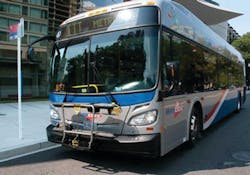DC: Metro Awards Contract for New Buses to Create All Low-Floor Fleet
In a move that will result in an all low-floor bus fleet, Metro announced July 18 that it has awarded NABI LLC a 5-year contract for the procurement of up to 654 new buses.
Today, Metro’s entire bus fleet is fully accessible for customers with disabilities. However, some older buses — roughly 18 percent of the fleet — are so-called “high-floor” buses, meaning that passengers must step up into the bus when boarding or use the accessible lift or ramp. Metro’s newer buses are all low-floor buses, where passengers board and ride at the same level as the curb. Due to their lack of steps, low-floor buses are easier to board and more convenient for riders.
The five-year contract with NABI will result in a Metrobus fleet that is comprised entirely of low-floor buses. In addition, the new buses will be more comfortable and fuel-efficient than those they replace. Specifically, the new buses will emit 80 percent less particulate matter and 96 percent less NOx than the 1997 model-year buses they will replace. The new buses are 20 percent more fuel efficient.
"This contract award will allow us to replace older, less efficient buses and advances our commitment to reducing emissions and improving fuel economy for years to come," said Richard Sarles, Metro general manager and CEO. “Refreshing the fleet also enables us to maintain existing levels of service while providing added customer benefits such as low-floor boarding, which is not only more convenient, but faster in terms of boarding and exit times.”
The first batch of 85 NABI diesel-electric hybrid 42-foot buses is already on order, with delivery expected within a year. The new buses will replace some of Metro’s older Orion V buses, which were delivered in 1997 and 2000. Going forward, the contract gives Metro the option to order up to 498 additional 42-foot buses and up to 71 60-foot buses over the five-year period. Metro has the option to choose diesel-electric or compressed natural gas (CNG) buses for the 42-foot models.
All buses will be manufactured in the U.S. at NABI’s Anniston, Ala., facility. The contract value for the first 85 buses, including spare parts and training, is just under $60 million.
The new buses are funded by Metro Forward, Metro's $5 billion capital program, which is made possible by support from the region's Congressional delegation and jurisdictional partners in Virginia, Maryland and the District of Columbia.
Metrobuses have a 15-year usable lifespan that includes a mid-life overhaul at 7.5 years. With a fleet of roughly 1,500 buses, the system replaces about 100 buses per year to keep the fleet safe, modern and reliable.




